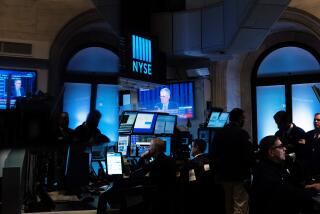Brokers Merge to Cash In on Baby Boomers
- Share via
Why is the smart money buying brokerage houses, and is it really smart to do so? Shearson Lehman Bros. informally offered roughly $1.6 billion, or $50 a share, for E. F. Hutton a week ago and, although rebuffed, would still like to buy Hutton. And bidders are coming out of the woodwork for Charles Schwab & Co., the discount brokerage subsidiary that BankAmerica wants to sell. Schwab, which B of A bought in 1983 for $52 million, could fetch $300 million on the rebound.
Why they’re bidding is simple: They anticipate an increase of customers for investment securities as the age group called the baby boomers grows older. The market is growing already. According to the New York Stock Exchange, there are now more than 47 million individual owners of stock in this country, counting owners of mutual funds, up from 25 million only a decade ago. Securities are sold, not bought, they say on Wall Street, and so today’s bidders think the more salespeople you have, the more you’ll sell.
Plenty of Buyers
That is why in the near term, brokerage houses are going to be hot acquisition candidates. Either Americans like Peter Cohen, president of the 5,700-broker-strong Shearson subsidiary of American Express, will buy them as he pursues his goal of doubling the number of Shearson’s brokers in five years. Or the Japanese will buy them, says Perrin Long of Lipper Analytical Services, the leading analyst of the brokerage industry. Firms such as Nomura and Daiwa Securities are big retail brokerage houses back home, but they would have to acquire a sales force to come into the U.S. market. And so their names crop up in the rumor mill whenever a brokerage stock shows unusual activity--including even the stock of Merrill Lynch, the biggest U.S. broker.
But, aside from the Japanese, whether buying a broker is a smart business decision--or even a good thing for the customers--is another question. To examine it, you should keep in mind that the product that brokerage houses most want to sell these days is not specific stocks and bonds but mutual funds. Why? Because mutual funds can mean years of management fees for the brokerage firm, the gift that keeps on giving compared to stocks and bonds.
That is, compared to $100 in a one-time commission on the sale of $5,000 worth of stock to a customer, the brokerage house can make $75 every year in management fees on $5,000 worth of a mutual fund--plus part of the $400 up-front sales commission if there is one. That is why in recent years brokerage firms have been pushing to get customers’ assets under management in a wide variety of mutual funds sponsored by the brokerages themselves.
No Assurance of Profitability
In one sense, it’s a case of the right product at the right time. With most investors seeking to preserve their capital rather than strike it rich, and with the stock market’s gyrations increasing because of institutional trading, the mutual fund becomes the investment vehicle for the individual.
But simply acquiring a brokerage house--as even automobile companies are thinking of doing--does not assure either customers or profitable business. The competition is fierce, first of all, from discount brokers such as Quick & Reilly and Charles Schwab--whose cost and commission structure is roughly half that of the traditional commission-earning brokers--and from the mail-order providers of mutual funds and other investment plans--Dreyfus Corp., for example, and Fidelity and T. Rowe Price. Their costs are much lower than those of the traditional brokerage house.
And their potential conflict of interest is less, suggests Benjamin F. Edwards III, the chairman of St. Louis-based A. G. Edwards & Sons. Edwards notes wryly that efforts to accumulate assets under management would appear to do more for the brokerage firm than for the customers. “With a variety of plans on the market, it stretches credulity to think that the best plan for the customer will always be the one sponsored by the broker’s own company,” he says. So there is no A. G. Edwards mutual fund, and the 2,550 Edwards brokers offer plans sponsored by others--although they, too, refrain from telling customers about good funds that charge no sales commission.
A. G. Edwards also is expanding--by opening offices rather than by acquisition. Brokerage house stocks, Ben Edwards thinks, have become expensive in the six years since merger fever hit the industry with Prudential Insurance’s acquisition of Bache. But only Edwards, whose great-grandfather founded the firm 99 years ago, seems to think that way. Others look at the population statistics and offer premium prices for acquisitions.
If they end up having paid too much, stock brokerage won’t be the first business to have been fooled by the promise of the baby boom.
More to Read
Inside the business of entertainment
The Wide Shot brings you news, analysis and insights on everything from streaming wars to production — and what it all means for the future.
You may occasionally receive promotional content from the Los Angeles Times.










